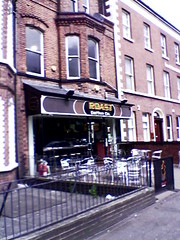Flagging....
| I've been reading Richard Ellis' To The Flag while doing my morning "work out" at the local Y (reading on the cross training makes the time go much faster), and I am finding the history relatively interesting, but not perhaps for the reason that Ellis stresses. That was confirmed for me yesterday as I listened to an interview with Ellis on NPR's "Fresh Air".... Ellis rightly emphasizes the role that fear and xenophobia played in the history of the "Pledge of Allegience" and the US obsession with flag displays, but there is so much more to get from this history. My interest in the shifting pedagogies of civic education leads me to read the story of the Pledge as a reflection of the "folk theories" of education that held sway during the late 1800s, and in that sense it gives us insight into the social theories of the time as well. I will probably blog more on that point in the future. For the moment, however, I want to highlight the link Ellis makes between flag-displaying/flag-pledging and popular fears and anxieties. It is obvious to anyone with eyes open that the US flag a pervasive presences in public spaces -- not merely at court houses and town squares, but along highways where it is found on display on numerous overpasses, bumper stickers plastered everywhere, atop construction cranes, and just about any other place you can imagine. Now, considering that I live and drive around the Sate of Massachusetts -- that well-known bastion of US left-liberalism -- I can only guess that these displays are even more prominent in other parts of the US. Is this a reflection of growing fear and anxiety? When this public displaying behavior first began after 9/11, I think it was more an expression of grief and an attempt to honor the fallen, as one would do when using the flag to drape a coffin. At some point, however, it became a open display of patriotic pride and wartime defiance -- 'don't tread on us' was the message, although it is obviously one we are sending to ourselves more than to any 'enemy'. Which got me to thinking about a recent study by Dominic Bryan and others at the Institute of Irish Studies at Queen's University Belfast. The issue of flag displays and their functions are quite different in Northern Ireland where flags and banners are used to mark boundaries and are often tools of intimidation. In that regard, the flag displaying behavior in the US might be regarded as quite different on an explicit level. And yet flag-waving in the US has also been a means for intimidating folks who might otherwise raise questions about the wisdom or effectiveness of US policies, something that clearly occured during the antiwar protests of the Vietnam War period. Interestingly that doesn't seem to be the case these days (at least it is not making headlines) -- which raises additional questions about the role of political symbols and patriotism.... Bottom line: context matters; but the empirical question remains, how does it matter? One or the more interesting historical twists raised by Ellis (in his radio interview, and I suspect somewhere in his book -- I just haven't read that far yet) is the major turnabout made by the US Supreme Court in 1943 when it decided that state governments could no longer require children to saluate (and pledge allegience to) the US flag. Just three years earlier the Court had upheld such mandates on the grounds that governments had a compelling interest in promoting patriotism. As Ellis indicates, it is not unheard of for the Court to change its mind -- but to make such a radical turnabout in three years was indeed quite unique. Context clearly impacted on both decisions -- in 1940 a US that is anxious about internal threats to its security seeks comfort in having children engage in the saluting/pledging ritual, while in 1943 a nation at war to defend freedoms finds it hypocritical to intrude on the religious freedom of families who find such rituals promote idol worshiping.... More thought on all this to come.... flagspatriotismNorthern Ireland |
Read more!






